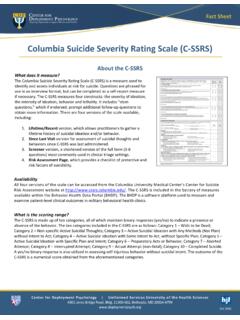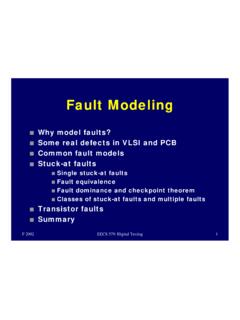Transcription of 12-Stuck Point Help Sheet For CPT Therapists 122110
1 10 stuck Point Help Sheet For CPT Therapists stuck points are thoughts that keep us from recovering. stuck points are concise statements that reflect a thought not a feeling, behavior, or event. When patients provide what they think are stuck points, but are not in stuck Point format, Socratic dialogue can be used to better identify the underlying stuck Point . Read pages 7-11 of the Therapist Manual to review how Socratic Dialogue can be used to elicit stuck points. Below are examples that are commonly misidentified as stuck points: Not a stuck Point : Trust Why not? This is a concept, not a thought.
2 It is not specific, and you need to identify what the person thinks about trust. In this example, you might ask him/her what about trust is a problem. Possible related stuck points: I can t trust anyone. If I let anyone get close to me, I will get hurt. I can never trust my judgment. Not a stuck Point : I am nervous whenever I go on a date Why not? This is describing a feeling, not a thought. In this example, you might ask what patients are telling themselves about the date to help them identify potential stuck points. Possible related stuck points: If I go on a date, I will get hurt.
3 People always take advantage of me. Not a stuck Point : I fight with my daughter all the time Why not? This is describing a behavior, not a thought. In this example, you might ask more about the client s thinking before, during, and after a recent fight with her daughter to identify possible stuck points. Possible related stuck points: I don t mean anything to her. I must be in control to keep her safe Not a stuck Point : I witnessed people die Why not? This is describing a fact, not a thought. In this example, you might ask for the client to describe the impact of witnessing others die.
4 What thoughts did he have at the time, what thoughts does he have now? Or after that statement asking - And, therefore? Possible related stuck points: It was my fault that people died. I should have done something to prevent it. Not a stuck Point : I don t know what will happen to me or ( What will happen to me? ) Why not? This is a question about the future. In order to find the stuck Point in this example, you might ask clients when they ask themselves that question, what is the answer they come up with? What is the meaning of that answer? Possible related stuck points: I will not have a future.
5 I am not deserving of good things in my future Not a stuck Point : The military should take care of soldiers Why not? This is a moral statement/golden rule and you want to identify the thought behind it. In this example, to find the stuck Point , you might ask what the moral statement means to them with respect to their own lives. Possible related stuck points: The military failed me I can t trust the government A few reminders about good stuck Point structure: Make sure the stuck Point is one concise thought, if the client provides multiple stuck points as one, make sure to break them apart and challenge them separately.
6 For example, It is my fault Joe died, I am a terrible person and I deserve to be punished, can be broken down into 3 different stuck points, It s my fault Joe died, I am a terrible person, and I deserve to be punished, which all would be challenged separately, starting with the assimilated thought, It is my fault Joe died. If you are struggling, put a statement into the , format if possible and have the client fill in the blank. For example, If I had seen the mine, then Joe would not have died . On the impact statement, you can underline stuck points and put into if/then format on the stuck Point Log.
7 stuck points are typically black/ white statements, and use extreme language. Extreme language can sometimes be hidden, for example, sometimes when a patient says It was my fault they really mean It was ALL my fault the second can be easier to get some movement on. stuck points are harder to challenge when they are too vague. Make it more specific by asking, How did you come to this conclusion? For example, I trust no one can be refined to If I trust others, then I ll get hurt. Keep your eye out for words that can have multiple interpretations, stuck points are easier to challenge when they are specific and do not make assumptions about the meaning of words.
8 For example, If I was normal, then I wouldn t have fallen apart. Here you can make the statement more specific by asking What do you mean by normal? and What do you mean by falling apart? Examples of stuck Points 1. If I had done my job better, then other people would have survived. (assimilated) 2. Other people were killed because I messed up. (assimilated) 3. Because I did not tell anyone, I am to blame for the abuse. (assimilated) 4. Because I did not fight against my attacker, the abuse is my fault. (assimilated) 5. I should have known he would hurt me. (assimilated) 6. It is my fault the accident happened.
9 (assimilated) 7. If I had been paying attention, no one would have died. (assimilated) 8. If I hadn t been drinking, it would not have happened. (assimilated) 9. I don't deserve to live when other people lost their lives. (over-accommodated) 10. If I let other people get close to me, I'll get hurt again. (over-accommodated) 11. Expressing any emotion means I will lose control of myself. (over-accommodated) 12. I must be on guard at all times. (over-accommodated) 13. I should be able to protect others. (over-accommodated) 14. I must control everything that happens to me. (over-accommodated) 15. Mistakes are intolerable and cause serious harm or death.
10 (over-accommodated) 16. No civilians can understand me. (over-accommodated) 17. If I let myself think about what has happened, I will never get it out of my mind. (over-accommodated) 18. I must respond to all threats with force. (over-accommodated) 19. I will go to hell because of the things that I have done. (over-accommodated) 20. I am unlovable. (over-accommodated) 21. Other people should not be trusted. (over-accommodated) 22. My hypervigilance is what keeps me safe. (over-accommodated) 23. If I have a happy life, I will be dishonoring my friends. (over-accommodated) 24. I have no control over my future.



















